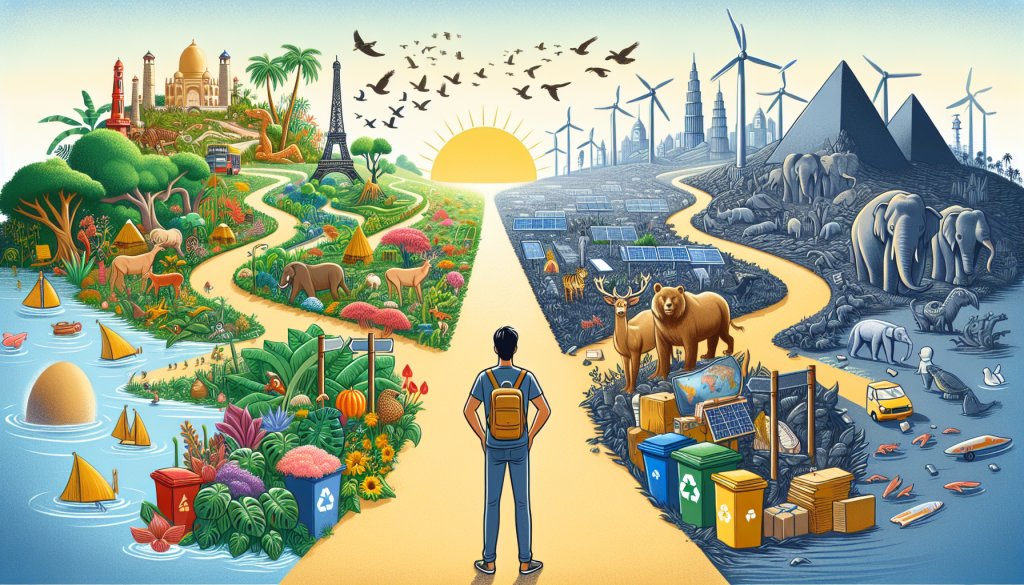
The Ethical Traveler’s Dilemma: Balancing Wanderlust with Responsibility
Traveling is a wonderful way to explore the world, experience new cultures, and create unforgettable memories. It has become easier as the world becomes more connected, with affordable flights and accommodation options just a click away. However, with the rise of social media and travel influencers, the desire to travel and explore new destinations has become even more pronounced. While wanderlust may be in our nature, the responsible traveler may ask themselves, what impact does my visit have on the places I visit? This is the ethical traveler’s dilemma – balancing their desire to wander with a responsibility to leave a positive impact.
Understanding Ethical Travel
Ethical travel is a growing trend amongst travelers who prioritize responsible and sustainable tourism. It’s about being mindful of the environmental, social, and economic impacts of our travels and making choices that benefit both the destination and its people. It’s also about preserving and respecting the natural and cultural heritage of the places we visit. With the increasing popularity of travel, the need for ethical travel has become more critical than ever before.
The Ethical Traveler’s Dilemma
The ethical traveler’s dilemma arises when we want to explore new places and immerse ourselves in different cultures, but also want to do so in a responsible and sustainable manner. As travelers, we have the power to contribute positively or negatively to the destinations we visit. From overtourism to environmental degradation, tourism can have both positive and negative impacts on a destination. The question then becomes, how can we balance our desire to wander with a responsibility to leave a positive impact?
Becoming a Responsible Traveler
The first step in becoming a responsible traveler is to educate ourselves about the places we visit. This includes understanding the local culture, customs, and laws. It’s also essential to research the environmental and social issues facing the destination. This knowledge will help us make informed decisions that align with our values and contribute positively to the local community.
Another key aspect of ethical travel is supporting local businesses and communities. This means staying in locally-owned accommodations, eating at family-owned restaurants, and purchasing souvenirs from local artisans. This not only supports the local economy but also allows us to have a more authentic experience.
Responsible travelers also prioritize minimizing their environmental impact. This includes reducing our carbon footprint by choosing eco-friendly transportation options, using reusable products, and minimizing waste. We should also be respectful of natural habitats and wildlife, refraining from activities that harm or exploit animals for entertainment purposes.
The Role of Technology in Ethical Travel
Technology has made travel more accessible and convenient, but it also has a role to play in ethical travel. It allows us to research and book responsible and sustainable travel options. Many travel companies and websites now offer eco-friendly accommodations, tours, and activities, making it easier for us to make responsible choices. We can also utilize technology to support local businesses and communities by using apps and websites that connect us with local guides and experiences.
The Ethical Traveler’s Impact
While it may seem like our individual actions may not make a significant impact, collectively, the choices we make as travelers can have a lasting influence on the places we visit. By being responsible travelers, we can help preserve destinations for future generations to enjoy. It also allows us to have a more meaningful and authentic travel experience, connecting with local cultures and supporting local communities.
In Conclusion
The ethical traveler’s dilemma may seem like a daunting challenge, but by being mindful and responsible in our travels, we can contribute to a more sustainable and responsible tourism industry. It’s about finding a balance between fulfilling our wanderlust while being mindful of our impact on the places we visit. Let’s embrace ethical travel and continue to explore the world responsibly.
Final Thoughts
As travelers, we have a responsibility to leave a positive impact on the destinations we visit. Ethical travel is about being mindful, respectful, and responsible. By educating ourselves, supporting local communities, and minimizing our environmental impact, we can become responsible travelers and contribute to a more sustainable world. The next time you embark on a journey, remember to be an ethical traveler, balancing your wanderlust with a responsibility to leave a positive impact.
